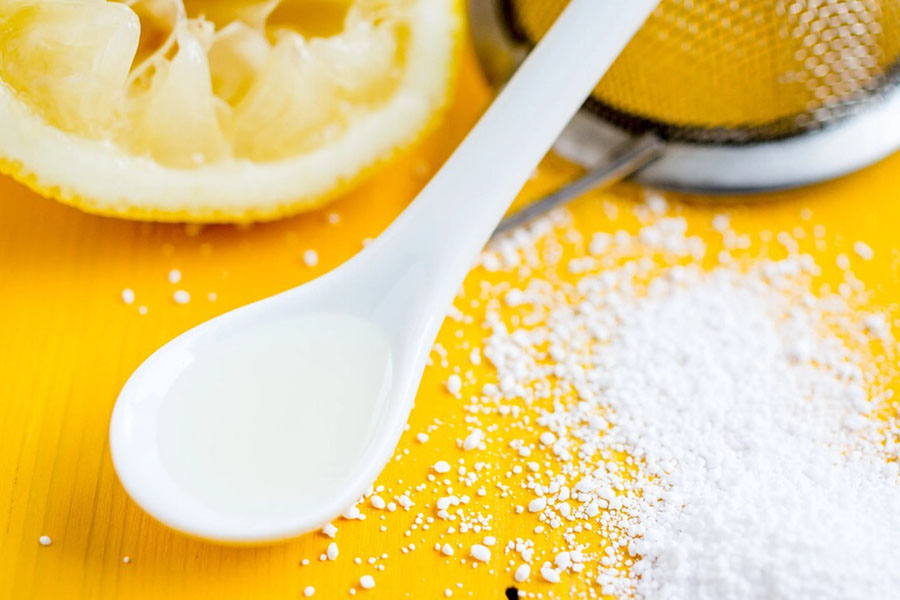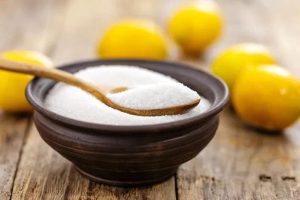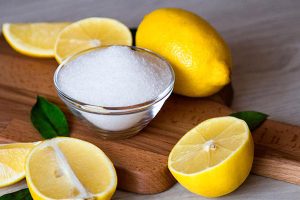Citric acid is a highly adaptable substance widely utilized in multiple industries. In the food industry, it is a flavoring agent, preservative, and acidity regulator, enhancing taste and extending shelf life. In cosmetics, citric acid is utilized for pH balancing and exfoliation, and as a chelating agent, improving the stability and effectiveness of products.
Additionally, it finds applications in pharmaceuticals as a buffering agent and in cleaning products as a descaling agent, highlighting its importance in everyday products and industrial processes.
Definitions and General Uses of Citric Acid Monohydrate and Citric Acid Anhydrous
Citric Acid Monohydrate

Citric acid monohydrate is a type of citric acid that includes one water molecule for each citric acid molecule. It is commonly found as colorless crystals or a white crystalline powder. This form is commonly used in the food and beverage industry to enhance flavor and act as a preservative. Additionally, it functions as a buffering agent in pharmaceuticals and as a chelating agent in cosmetics and cleaning products.
Citric Acid Anhydrous
In contrast, citric acid anhydrous is the anhydrous form of citric acid, meaning it is devoid of any water. It is also a white crystalline powder, but unlike its hydrated counterpart, it is entirely free of water. This form is preferred when water content must be minimized, such as in dry food products, and industrial applications. Like its monohydrate counterpart, Citric Acid Anhydrous is used for flavor enhancement, preservation, and pH adjustment across various sectors.
Chemical Properties and Structure
Chemical Structure and Molecular Formula of Citric Acid Monohydrate
Citric acid monohydrate includes one water molecule incorporated within its crystal structure. Its molecular formula is C₆H₈O₇·H₂O, indicating the presence of water bound within the crystal lattice. This water content slightly alters its molecular weight and properties compared to its anhydrous form.
Chemical Structure and Molecular Formula of Citric Acid Anhydrous
Citric acid anhydrous does not contain water molecules, with a molecular formula of C₆H₈O₇. It is essentially the same compound as the monohydrate but lacks water, making it more concentrated in terms of the active citric acid content.
Differences in Crystalline Forms and Appearance

Citric acid monohydrate typically appears as larger, more transparent crystals due to the presence of water, which impacts its crystal structure. Citric Acid Anhydrous, without water, tends to form smaller, more opaque crystals or a fine powder. The absence of water also makes the anhydrous form slightly denser and less prone to clumping under dry conditions. These structural differences can affect their handling and storage.
Physical Properties
Comparison of Melting Point, Boiling Point, and Solubility
Citric acid monohydrate has a lower melting point due to its water content and decomposes around 135°C. It dissolves readily in water, resulting in an acidic solution. Citric acid anhydrous, with no water, has a higher melting point of around 153°C and is also highly water-soluble but produces a more concentrated solution.
Differences in Density and Molecular Weight
Citric acid monohydrate is less dense than its anhydrous counterpart due to the presence of water molecules, which also increase its molecular weight. Citric acid anhydrous, being more compact, has a higher density and slightly lower molecular weight, making it more efficient in applications where space or weight is a concern.
Production and Manufacturing
Production Process of Citric Acid Monohydrate
Citric acid monohydrate is produced through the fermentation of sugars using the mold Aspergillus niger, followed by crystallization in water, which incorporates one molecule of water into the citric acid crystals.
Production Process of Citric Acid Anhydrous

The production of citric acid anhydrous follows a similar fermentation process. However, it undergoes an additional drying step to remove water, resulting in a water-free crystalline powder.
Techniques and Conditions for Removing Water
To produce the anhydrous form, techniques such as vacuum drying, spray drying, or controlled heating are used. These methods must be carefully controlled to ensure complete water removal without decomposing the citric acid, ensuring a stable and pure final product.
Applications and Uses
Applications in the Food Industry
Citric acid monohydrate and citric acid anhydrous are widely used as flavor enhancers, providing a sour taste to foods and beverages. They also serve as preservatives by lowering pH, which inhibits microbial growth. Additionally, they act as emulsifying agents in certain products.
Applications in Cosmetics
In cosmetics, citric acid is employed to adjust the pH of formulations, enhancing product stability and compatibility with skin. It also serves as a chelating agent, binding metals and preventing their interaction with other ingredients, which can cause degradation or instability.
Other Industrial Uses
Citric acid is employed in numerous industrial applications, such as in cleaning products, where it functions as a descaling agent to eliminate limescale and mineral deposits. It is also used in water treatment processes and serves as an eco-friendly alternative to phosphates in detergents, providing environmental benefits.
Storage and Stability
Impact of Storage Conditions on Both Forms of Citric Acid
Citric acid monohydrate should be kept in a cool, dry environment to avoid moisture absorption, which can cause clumping. Citric acid anhydrous is more stable under similar conditions but is hygroscopic and can absorb moisture from the air, potentially altering its weight and effectiveness.
Comparison of Hygroscopicity and Stability
Citric acid anhydrous, lacking water, is more hygroscopic than citric acid monohydrate, making it more sensitive to humid environments. This increased hygroscopicity can lead to challenges in maintaining its purity and stability, requiring airtight storage solutions to prevent moisture uptake and ensure long-term stability.
Conclusion
Key Differences and Appropriate Usage Scenarios
Citric acid monohydrate contains water, making it suitable for applications where moisture is beneficial, such as in certain food products and pharmaceuticals. Citric acid anhydrous, being water-free, is preferred in dry formulations and applications requiring concentrated citric acid.
Recommendations for Selecting the Suitable Form
Citric acid monohydrate is ideal for food and beverage applications where a crystalline form and slight moisture are advantageous. Citric acid anhydrous is the better choice for industrial uses requiring high purity and minimal water content. Consideration of specific application needs and storage conditions is crucial for optimal performance.
